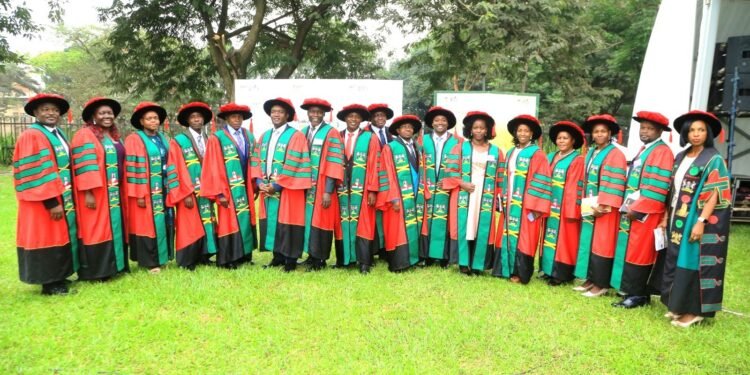As Makerere University hosts its highly anticipated 74th graduation, commencing on January 29th, 2024, a crucial matter emerges — the transition to a research-led university, posing a risk to undergraduate students.
The ongoing graduation includes 131 PhDs (47 female, 84 male), 1,587 Masters (700 female, 887 male), 156 Postgraduate Diplomas (67 female, 89 male), 11,016 Undergraduate Degrees (5,990 female, 5,026 male), and 24 Undergraduate Diplomas (15 female, 9 male) across all Colleges.
The initiative to transform Makerere into a research-driven institution holds great promise, potentially advancing research with groundbreaking discoveries and innovations.
However, the implementation strategy for this endeavor carries the risk of potentially destabilizing the university’s ecosystems and operations, as undergraduate students face risks of being kicked out of this illustrious university.
Of noteworthy mention, international donor agencies have pumped considerable funds into Makerere University’s research and innovation initiatives, ultimately making the university achieve remarkable strides in the area of research.
In light to this, the university has come up with peculiar research strategies and directions, on top of revitalizing graduate training and management, undoubteldly underscoring it as an institution of higher learning on the rise.
For instance; according to the research produced by Higher Education Research and Advocacy Network in Africa (HERANA) in 2021, this East African oldest institution of higher learning is the second after Cape Town among flagships in eight African countries in terms of knowledge production and research.
While presiding over the function to celebrate Prof Timothy Wangusa, Uganda’s first professor of Literature and Makerere’s first PhD graduate of literature in July 2022, Prof Umar Kakumba, the Deputy Vice Chancellor in charge of Academic Affairs asserted that becoming a research led University is now Makerere’s top priority.
“In celebrating 100 years, Makerere has also positioned itself, and our mantra is to become a research led university. And research led, in many ways has backward and forward linkages because research supports and embeds training,” remarked Prof Kakumba.
Hence, to cement this remarkable accomplishment and attain unparalleled heights, the university administration has decided to transition Makerere into a solely research-focused institution.
However, this transformation will occur gradually. As per this ambitious scheme, the university intends to reduce the intake of undergraduate students.
This reduction will incrementally increase with each successive academic year until the university ceases to admit undergraduate students altogether. Subsequently, only master’s and PhD students will be enrolled.
It is phenomenal to assert that this ambitious plan seems akin to putting a cart infront of a horse. It carries the risk of destabilizing Uganda’s education system and dashing the aspirations of numerous learners who aim to achieve academic excellence at this esteemed East African institution of higher learning.
As the university aspires to be the preeminent hub for knowledge production in Africa, it currently boasts the highest enrollment of undergraduate students compared to any other university in Uganda.
Therefore, reducing the intake of undergraduates each academic year, and eventually ceasing admissions altogether, is likely to be a significant disappointment for a multitude of learners and their parents. They will miss out on the opportunity for this high-quality education.
Adding yeast to the already fermented bread, the university has not designated an alternative outlet or branch where undergraduate learners can access this exceptional education after being denied entry at the main campus.
It would be prudent to establish a branch, such as the Jinja campus or Nakawa branch, to accommodate the large numbers of undergraduate learners who may be turned away from the main campus. Regrettably, such an arrangement does not appear to be under consideration by the administration.
However, this configuration presents a substantial risk of destabilizing the university’s ecosystems. The count of undergraduate students at Makerere University exceeds the combined total of both master’s and PhD students by an unprecedented margin. Among the 12,914 students graduating, a remarkable 11,016 learners belong to the undergraduate cohort
The presence of these learners at the university has become a life line to many individuals and businesses around the university. In fact, the major economic activity around the university is investment in rentals and hostels for these lerners to reside.
In addition, a vast array of businesses have flourished as a result of this huge number of undergraduate learners at the university, in parts of Wandegeya, Mulago, Kalerwe, Bwaise, Kikoni, Kasubi, Nakasero and Nakulabye.
Businesses like electronics shops, food kiosks, gyms and wellness centers, health facilities, restaurants, boutiques, supermarkets, gaming centers and others, have flourished in these areas, employing a huge number of Ugandans.
Closing the gates of Makerere University for the majority of undergraduate learners will ultimately lead to the crumbling of these businesses, heighten unemployment phenomenon, exacerbate unlawlessness and perpetuate crime.
In the final analysis, the notion of transforming Makerere University into a research-driven institution offers remarkable prospects and should be pursued, without any endeavors to decrease or halt the admission of undergraduate learners.
The writer Mourice Muhoozi is the Public Relations Volunteer, Uganda Tourism Board (UTB)
Do you have a story in your community or an opinion to share with us: Email us at editorial@watchdoguganda.com












